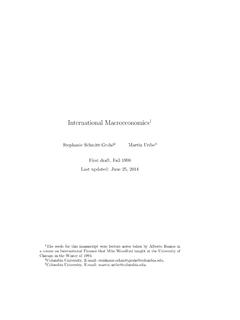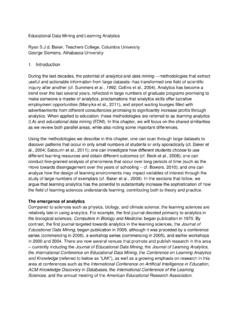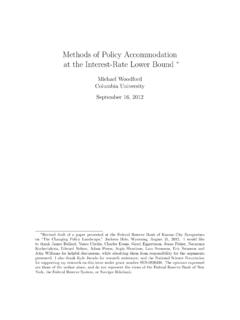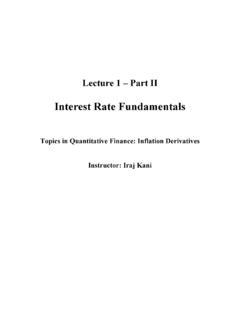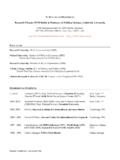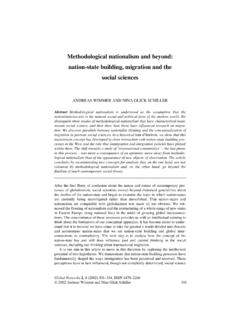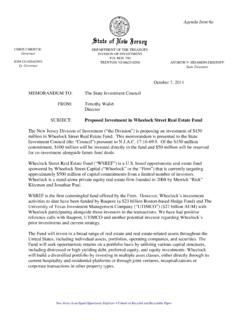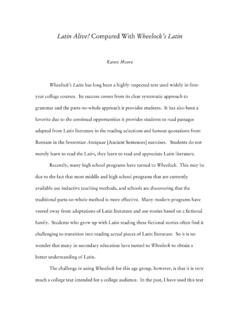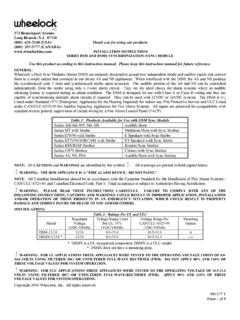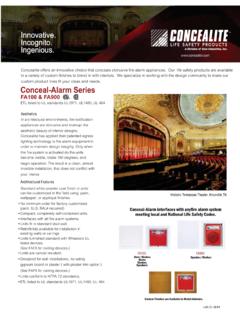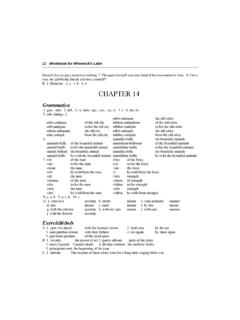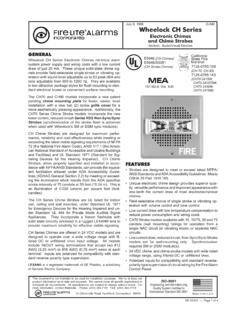Transcription of Eleazar Wheelock: The Man and His Legacy
1 Eleazar wheelock : The Man and His Legacy Three hundred years after his birth, Dartmouth still owes much to its founder Alex de Sherbinin 84 April 2011 On June 27, 1776, even as Jefferson was putting the finishing touches on the Declaration of Independence, which placed the life, liberty, and the pursuit of happiness as a central concern in America s quest for freedom from the British, wheelock delivered the following sermon. In some senses it was a capstone to a life dedicated to promoting a right understanding of the pursuit of happiness.
2 It is very certain that men, one generation after another, are fondly desirous of happiness and in eager pursuit of it; they would fain have the various appetites and cravings satisfied, and come to be in such a state of pleasure and joy as best suits with their inclinations. And the reason why the generality of mankind go into very unsuitable methods and courses for obtaining happiness, because they have very mistaken and wrong notions and apprehensions about it, accounting the real and lasting felicity to consist in something which is not essential to it, or which at most is not considerable ingredient of it.
3 It is very evil and the thoughts about happiness differ as much from the truth as a man s dreams do from the just conception and judgment of things he has in his waking hours. This work is covered by Creative Commons Attribution ShareAlike (CC BY SA ) license. The author can be contacted by email at 2 Eleazar wheelock (b. April 22, 1711), pastor, evangelist, teacher, farmer, family man, and founder of Dartmouth College, single mindedly pursued a vision, his so called Grand Design , of an educational institution for Native Americans and English missionaries that would be an instrument of salvation for native populations in the Northeast.
4 By examining the man and his mission we discover a gifted leader who was driven to succeed despite many obstacles. His Legacy is still with us today in a variety of ways; indeed, the College owes a great debt to this man of high principle with a compassionate heart and a cross cultural outlook that was well ahead of its time. wheelock , a second generation Connecticut Yankee and third generation Puritan New Englander, was born into a prosperous farming family in Windham. His father, Ralph, owned a farm of 300 acres.
5 His family was well educated and relatively prominent his great grandfather obtained a master s degree from Cambridge before arriving in Dedham, Massachusetts in 1637. His mother, Ruth Huntington of Norwich, Connecticut, was of similar solid New England stock. Eleazar was their only son. Not much is known about Eleazar s childhood, but we do know that in 1729 he entered Yale, and that he was a promising scholar. That he had a religious and philosophical bent early in life is witnessed by extracts from a letter he sent to his parents at the age of 22, in which he considers the futility of human happiness apart from God.
6 Most Dear and Honored parents, Though the great and principal things that we seem to have respect to in all our actions is happiness, a desire of which is implanted in our natures by their [We] are almost always flattering ourselves with the prospect of something that we hope to take satisfaction in, which if we aren t wholly disappointed of yet we seldom find that satisfaction in fruition we promised Very good reason I think had the wise man to pronounce vanity of them all for verily all is vanity.
7 Your Dutiful son, Eleazar wheelock This theme of happiness was one that he would come back to later in his life, for he saw it as the wellspring of all action, yet also the source of many vexations. After a post graduate year of theology, wheelock was called to the pastorate and took a position in Lebanon, Connecticut in 1735. There he would serve for 34 years, a remarkable stint by today s standards. But wheelock was much more than a local pastor. Like many contemporaries in the pastorate, he was a farmer, family man, private tutor, and enforcer of the town s moral standards, since most residents were also church members.
8 By age 48 wheelock had two step children and eight children by two wives (his first wife died in 1746). He was also an effective orator and active participant in the first Great Awakening of the late 1730s and 1740s, a period of spiritual outpouring in New England. wheelock was in much demand as a revivalist; in one year alone he is reported to have preached 465 sermons. He was no stranger to controversy, either. As an itinerant preacher himself, he initially supported the rights of itinerant preachers (or so called 3 new lights ) to preach in towns without invitation and even to criticize local clergy.
9 Under attack by old lights for his views, his peripatetic preaching, and the neglect of his own parish, he was deprived of his salary in 1743 by the General Assembly. Eventually he would temper his views, but the removal of his salary did prompt wheelock to take in students for the first time, effectively launching his career in education. In 1932, Dartmouth professor and wheelock biographer James McCallum wrote, Today we hear so much about the rush of modern life and the lack of time that there is a tendency to look back on this eighteenth century minister as a man of comparative leisure, going about his duties in an unharassed manner.
10 The contrary is true. wheelock was hurried, and he felt he was hurried. Frequently we come across comments such as I have but a moment to write, I am in the midst of affairs, I am in addition to my hurry about haying of a wheelock s lay duties were in themselves sufficient for the ordinary man. But so, too, was each of his other occupations. Examining some of the more than 5,000 items in the wheelock collection at Rauner Library, one gets the sense of a man very much engaged in the issues of the day who was regularly consulted on a range of church and civil matters.
